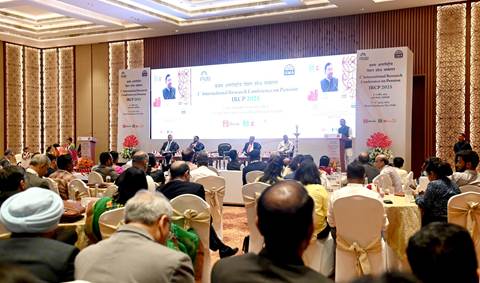India concluded its first-ever International Research Conference on Pension (IRCP) 2025 on April 4, 2025, in New Delhi. The two-day event, held at Bharat Mandapam and inaugurated by the Minister of State for Finance, Pankaj Chaudhary, marked a significant milestone in the nation’s efforts to address the challenges posed by its evolving demographic landscape. Organized by the Pension Fund Regulatory and Development Authority (PFRDA) in collaboration with the Indian Institute of Management Ahmedabad (IIMA), the conference brought together policymakers, scholars, industry leaders, and international experts to deliberate on pension reforms and strategies for ensuring the financial independence of India’s aging population.
In his keynote address, the Minister underscored the urgent need for inclusive pension reforms, citing India’s shifting demographic trends. By 2050, one in five Indians will be over the age of 60, and by 2047, the elderly population is expected to outnumber children. With 19 percent of the population projected to be elderly by mid-century, the Minister stressed that “Pension for All” must become a national priority. He called for comprehensive policy action to secure a dignified future for the aging population, emphasizing the significant challenges faced by elderly women due to their disproportionate representation among the elderly.
The Secretary of the Department of Financial Services highlighted the transformative potential of India’s pension framework. He emphasized the Unified Pension System (UPS), which ensures an assured pension amounting to 50 percent of the average basic pay drawn over the last 12 months before retirement. Despite significant strides, India’s pension assets currently account for 17 percent of GDP, far below the 80 percent average observed in OECD countries, revealing the critical need for expanded coverage and readiness.
The Chairperson of PFRDA, Deepak Mohanty, praised the National Pension System (NPS) for becoming a cornerstone of India’s pension sector, with 8.4 crore subscribers and an accumulated corpus of ₹14.4 trillion. He reaffirmed the agency’s commitment to leveraging technology and innovation to build a financially inclusive pension ecosystem that secures the future of millions.
The conference featured dynamic panel discussions and research presentations, exploring diverse aspects of pension systems, investment practices, and financial literacy. One key session examined global strategies for creating resilient old-age income security, moderated by Somya Kanti Gosh of the Finance Commission, with speakers including representatives from South Africa, Nigeria, and global industry experts. Other discussions delved into innovative investment practices, harmonization of pension policies, and the inclusion of informal and gig economy workers within the pension framework.
On the second day, the conference spotlighted financial literacy as a cornerstone of sustainable retirement planning. Experts from leading academic institutions proposed integrating financial education into school curricula under the National Education Policy (NEP), addressing societal biases, and using modern outreach techniques like influencer marketing. Discussions also emphasized optimizing pension fund investments through diversified portfolios, stress-testing, and adopting advanced technologies like AI for decision-making. Prominent researchers were honored for their contributions, underscoring the event’s focus on fostering innovation.
The conference concluded with a vote of thanks from senior officials, marking a significant step in India’s journey toward building a secure and inclusive pension landscape for its growing elderly population.





